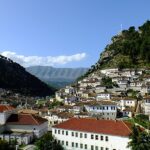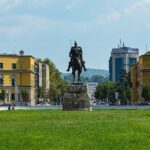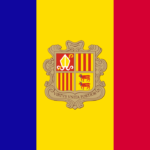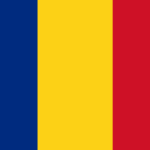Albania
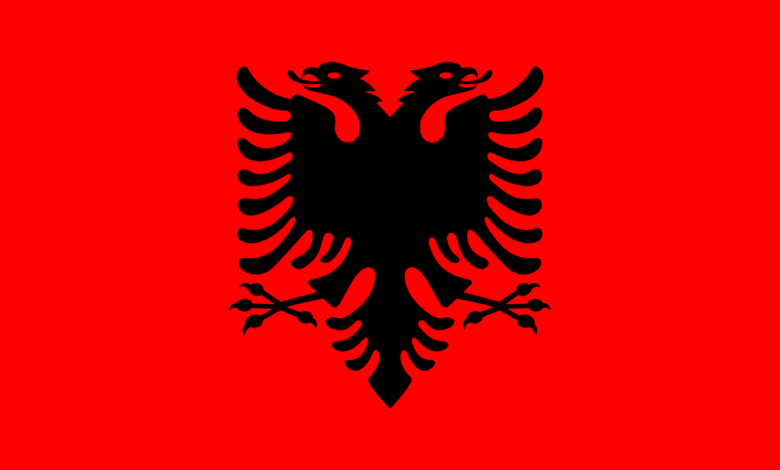
Albania ( Albanian: Shqipëri or Shqipëria), officially the Republic of Albania (Albanian: Republika e Shqipërisë), is a country in Southeastern Europe. It is located on the Adriatic and Ionian Seas within the Mediterranean Sea and shares land borders with Montenegro to the northwest, Kosovo to the northeast, North Macedonia to the east and Greece to the south. Tirana is its capital and largest city, followed by Durrës, Vlorë, and Shkodër.
Albania displays varied climatic, geological, hydrological, and morphological conditions, defined in an area of 28,748 km2 (11,100 sq mi). It possesses significant diversity with the landscape ranging from the snow-capped mountains in the Albanian Alps as well as the Korab, Skanderbeg, Pindus and Ceraunian Mountains to the hot and sunny coasts of the Albanian Adriatic and Ionian Sea along the Mediterranean Sea.
Albania has been inhabited by different civilisations over time, such as the Illyrians, Thracians, Greeks, Romans, Byzantines, Venetians, and Ottomans. The Albanians established the autonomous Principality of Arbër in the 12th century. The Kingdom of Albania and the Principality of Albania formed between the 13th and 14th centuries. Prior to the Ottoman conquest of Albania in the 15th century, the Albanian resistance to Ottoman expansion into Europe led by Skanderbeg won them acclaim over most of Europe. Albania remained under the Ottoman rule for nearly five centuries, during which many Albanians (known as Arnauts) attained high-ranking offices in the empire, especially in the Southern Balkans and Egypt. Between the 18th and 19th centuries, cultural developments, widely attributed to Albanians having gathered both spiritual and intellectual strength, conclusively led to the Albanian Renaissance.
After the defeat of the Ottomans in the Balkan Wars, the modern nation-state of Albania declared independence in 1912. In the 20th century, the Kingdom of Albania was invaded by Italy, which formed Greater Albania before becoming a protectorate of Nazi Germany. Enver Hoxha formed the People’s Socialist Republic of Albania after World War II, modelled under the terms of Hoxhaism. The Revolutions of 1991 concluded the fall of communism in Albania and eventually the establishment of the current Republic of Albania.
Albania is a unitary parliamentary constitutional republic. It is a developing country, ranking 67th on the Human Development Index, with an upper-middle income economy dominated by the service sector, followed by manufacturing. It went through a process of transition following the end of communism in 1990, from centralised planning to a market-based economy. Albania provides universal health care and free primary and secondary education to its citizens. Albania is a member of the United Nations, World Bank, UNESCO, NATO, WTO, COE, OSCE, and OIC. It has been an official candidate for membership in the European Union since 2014. It is one of the founding members of the Energy Community, including the Organization of the Black Sea Economic Cooperation and Union for the Mediterranean.
Map View
Government:
Type: Parliamentary republic.
Constitution: Adopted by popular referendum on 28 November 1998.
Independence: 28 November 1912 (from the Ottoman Empire).
People:
Nationality: Albanian(s)
Ethnic groups: Albanian 98.6%, Greeks 1.17%, others 0.23% (Vlachs, Roma, Serbs, Montenegrins, Macedonians, Egyptians, and Bulgarians).
Religions: Muslim (Sunni and Bektashi) 70%, Albanian Orthodox 20%, and Roman Catholic 10%.
Literacy: 86.5%; male: 93.3%, female: 79.5%
Resources
Natural resources: Petroleum, natural gas, coal, bauxite, chromite, copper, iron ore, nickel, salt, timber, and hydropower.
Agriculture products: Wheat, corn, potatoes, vegetables, fruits, sugar beets, grapes; meat, dairy products.
Industries: Food processing, textiles and clothing; lumber, oil, cement, chemicals, mining, basic metals, hydropower.
Business & Economy
Albania, a formerly closed, centrally-planned state, is making the difficult transition to a more modern open-market economy. The agricultural sector, which accounts for almost half of employment but only about one-fifth of GDP, is limited primarily to small family operations and subsistence farming, because of a lack of modern equipment, unclear property rights, and the prevalence of small, inefficient plots of land.
A weak judicial system, poor enforcement of contracts and property issues, and antiquated infrastructure contribute to Albania’s poor business environment.
Banka e Shqiperise
The Central Bank of the Republic of Albania.
Trade
Albanian Center for International Trade – ACIT
Established by the Institute for Contemporary Studies (ISB) and the United States Agency for International Development (USAID)
Transportation
Albawings
Albanian Airlines is headquartered in Tirana with its hub at Tirana International Airport.
Albawings commenced operations in 2016.
More information
| Education | |
| University of Tirana The State University of Tirana was founded in October 1957. Albania’s first university. |
| Environment & Nature | |
| Ministria e Mjedisit, Pyjeve dhe Administrimit te Ujerave The Albanian Ministry of Environment, Forestry and Water Administration. |
| History | |
Albanian History Albania’s History from Origins until the Collapse of Communism, with a history time line History of Albania Wikipedia: Albania’s History from Prehistory to Post-Communist Albania. |
Further Reading
- Background Notes: Albania
- The Heritage Foundation: Albania
- Human Rights Watch: Albania
- globalEDGE: Albania
- OEC: Albania
- Wikipedia: Albania
- The World Factbook — Albania
